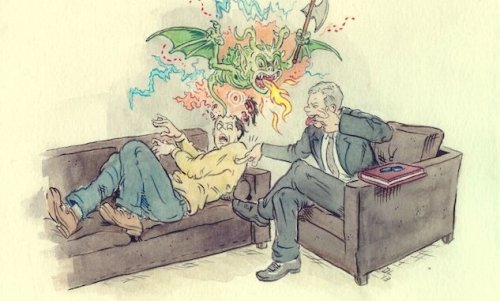5 Reasons Why Psychotherapy May Fail

Psychotherapy fails for different reasons, but that failure is always relative. The simple fact of having started the process is positive. That same disposition to get better and the interest to do so represent self-love and a willingness to get better.
It’s not easy to make the decision of exposing your whole inner world to a person you don’t know. You know that person is a professional, but that doesn’t erase the fact that most of us need to know the person better before sharing our feelings. If we go to a psychotherapist, it’s because we feel we need help. But sometimes, something simply goes wrong and it doesn’t work.
No matter the cause of failure, you should always give it another chance. In this world, nothing ever goes exactly as planned. What’s important, in any case, is our decision to get better. And it’s always good to take into account the main reasons why a therapy session may have failed.
“The greatest discovery of my generation is that a human being can alter his life by altering his attitudes.”
-William James-
1. Lack of commitment
The main protagonist in a therapy session is the patient. The person who goes to a see a psychotherapist should make a basic commitment to go. That commitment is, above all, a commitment to themselves.

The commitment is honored by being on time for sessions regularly and doing everything possible to overcome one’s problems. The key is wanting to discover the reasons for the problems and the paths to overcome them. Sadly, however, this isn’t always the case.
2. Too much is expected from the psychotherapist
One of the most common reasons why psychotherapy fails is expecting too much from the therapist. Some people expect all the answers to their problems. Nothing could be further from the truth.
Therapists aren’t magicians, nor gurus, nor fortune tellers. They aren’t guides either, in the strictest sense. Their role is to accompany us and lead the way so we can get to know ourselves better. They’re trained to help whoever asks for it. The goal is for a more objective and intelligent interpretation. Strictly speaking, they don’t have the power to change anybody’s life.
3. Too much resistance
It’s normal to get attached to our problems and the wrong ways we solve them. Every problem, however severe, has secondary benefits. For example, self-victimization can help justify the lack of action or the hesitation to change. That’s why we find it hard to let go of our problems.
That’s what we call resistance. In most cases, it’s an unconscious decision. Resistance may make us abandon the sessions when we reach critical points. Many times, psychotherapy fails because the patient doesn’t overcome the resistance to change.

4. Wrong motives
The therapeutic space allows us to reflect on the ways we think, feel, or act. The goal is to identify the factors that are making us uncomfortable. It also helps us identify other ways of perceiving our personal reality and create a fuller and more satisfied life.
However, people don’t always go to therapy because of these reasons. Sometimes, they do it because they want to solve a specific problem. They don’t want to explore their inner selves. Instead, they want to find a formula to solve a dead end. For example, they want their partner to change, and they go to a session to find out how to do it. Psychotherapy fails if the motives are of this type.
5. A bad relationship with the psychotherapist
The relationship with the psychotherapist is strictly professional. However, this doesn’t erase the fact that it’s a bond between two human beings. Therefore, there’s never a guarantee that the chemistry will be good between the two. Psychotherapy fails on some occasions because of this factor.

A good therapy is a gift everyone should give to themselves sometime. It’s not something that will solve all your problems nor guarantee happiness. Nobody is guaranteed happiness. However, it’s a space that allows people to rethink and renovate. Cleansing your inner world and putting some things in order always leaves you with something positive, even if the psychotherapy fails.
All cited sources were thoroughly reviewed by our team to ensure their quality, reliability, currency, and validity. The bibliography of this article was considered reliable and of academic or scientific accuracy.
- Vasquez, M. J. T., & Johnson, J. D. (2015). Psychotherapy. In Encyclopedia of Mental Health: Second Edition. https://doi.org/10.1016/B978-0-12-397045-9.00034-3
- Shedler, J. (2010). The Efficacy of Psychodynamic Psychotherapy. American Psychologist. https://doi.org/10.1037/a0018378
- Horvath, A. O., Del Re, A. C., Flückiger, C., & Symonds, D. (2011). Alliance in Individual Psychotherapy. Psychotherapy. https://doi.org/10.1037/a0022186
This text is provided for informational purposes only and does not replace consultation with a professional. If in doubt, consult your specialist.








